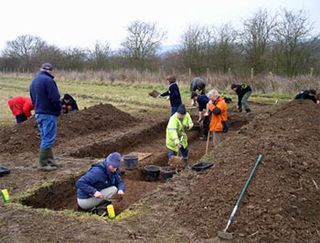Archaeology and the Big Society and metal detectors

The main Saturday morning news featured the troubles of professional archaeology. There were now, we were told, 7% fewer professional archaeologists than however many months ago and indeed archaeology was "more reliant on volunteers" than it had ever been before.
My guess is that this did not make the nation's heart bleed. I suspect that most people did not realise that there was a "profession" of "professional archaeology" - and many of those that did would not have rated its importance along with teachers and nurses etc. Which is a pity.
The professional archaeological 'units', spread across the country, have done more than most to ensure that the deep past has not been bulldozed. In fact, most of the new understandings of the early history of London has come from the work of the professional team at the Museum of London (and I wonder what is happening to them in the big MOL shake up). And the same goes for other units in loads of ancient towns and regions. They have dashed into the sites in advance of building development, and extracted all kinds of information from them.
The problem for these units is the recession: not only does the government think that archaeology is the kind of icing on the cake that can be cut, but if little development is going on there are fewer sites for the units to rescue.
So far, so good.
But the idea that archaeology is now more reliant than ever before on volunteer labour is only the idea conjured up by a very short memory indeed.
In the early 70s, when I was a sixth-former and then undergraduate, archaeology was almost entirely volunteer. I did all kinds of relatively responsible archaeological tasks aged c17, that would now be done only by trained professionals. Good or bad, I am not sure.
But a few years ago "volunteering" had almost disappeared from archaeology -- as the professionalized university discipline had taken over the old (skilled) amateur pursuit. Go back to the 1930s and 40s and archaeology WAS by definition an amateur activity. And some of the most influential excavations in this country were done by volunteer labour (eg at Maiden Castle).
In some senses, the professionalisation has been a very good thing (for a start it has enabled archaeologists to react quickly to building works etc, and to get in there with 5 days to spare and look at what was about to be destroyed). In another sense it has pushed the amateur to the margins. It is no coincidence that the rise of metal deteting has gone hand in hand with the rise of the professionalisation of the discipline. As there have been "no vacancies" for amateur diggers, those who would have been filling the Sunday cohorts of excavators have taken to private enterprise and to the glamour of the detector.
I am not usually an advocate of the Big Society, but maybe getting the "amateurs" back on board will help, rather than hinder, archaeology.
Mary Beard's Blog
- Mary Beard's profile
- 4084 followers



